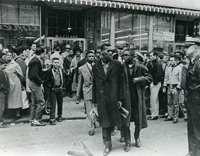| Notes: | The Nashville Sit-in Movement officially began with the first sit-in taking place on February 7th 1960. Yet, this was preceded by months of student participation in workshops, conducted by the Vanderbilt Divinity School’s own James Lawson. These workshops dealt with the discipline of nonviolence as espoused by Gandhi with specific reflection on the Christian faith and its role in bringing about peace and love. Born, then, from a profound emphasis on the teachings of the Christian tradition, the sit-ins served as a concrete response to the injustice of segregation in U.S. society. As supporter and activist John Lewis recalls his involvement and experiences in the movement, it is evident how the impetus of the Christian faith to love one’s neighbors as one’s self was continually sacrificed in the face of racist bigotry. He states, “We went into the five-and-tens—Woolworth, Kresge’s, McClellan’s—because these stores were known all across the South…We took our seats in a very orderly, peaceful fashion. The students were dressed like they were on the way to church or going to a big social affair. … The managers ordered that the lunch counters be closed, that the restaurants be closed, and we’d just sit there all day long.” For the managers of these local businesses to deny service appears to be a small and insignificant act. However, when reflecting on the week's text of Deuteronomy 26: 1-11, we are made aware of how antithetical their action is in light of the spirit of word on which the Christian message rests. |
|---|

